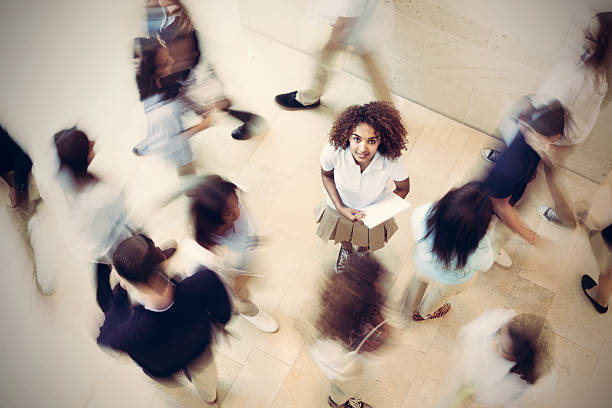Lauren Tarver | Jan. 2025
Introduction
The COVID-19 pandemic profoundly disrupted education, shifting students to remote learning and reducing structured peer interactions. As a result, high school students have struggled to regain critical social skills necessary for communication, teamwork, and conflict resolution. This study explores the post-pandemic decline in social skills within a personal finance classroom in Lake County, IL, and examines targeted interventions designed to rebuild these essential abilities.
The Problem Stated
The transition to online learning created barriers to student collaboration, leading to decreased interpersonal skills (Webster, 2024). Observations in a high school personal finance classroom reveal that students struggle with communication, group work, and conflict resolution. The literature suggests that these deficits hinder both academic and social success. The pandemic-induced isolation has contributed to students’ inability to effectively engage in group activities, which could lead to increased disciplinary actions (Seyahi et al., 2022). Addressing these challenges is vital for fostering a supportive educational environment.
Research Questions
The decline in social skills among high school students following the COVID-19 pandemic has created significant challenges in classroom collaboration, communication, and conflict resolution. As students transitioned back to in-person learning, educators have had to identify and implement effective strategies to rebuild these essential interpersonal abilities. Focusing on addressing these gaps through targeted interventions, including collaborative learning activities, role-playing scenarios, and technology integration is essential for growth and development of our students.
As educators we can start by addressing three key questions. These questions aim to explore the effectiveness of structured social skill interventions in a high school classroom.
- How can collaborative learning activities improve high school students’ teamwork skills?
- What role do role-playing scenarios play in enhancing students’ communication and conflict resolution abilities?
- How does improving students’ social skills contribute to overall academic and personal success post-pandemic?
By investigating how collaborative learning fosters teamwork, how role-playing enhances communication and conflict resolution, and how improved social skills contribute to academic and personal success, we can seek to provide actionable insights for educators. The findings from said inquiries should inform best practices for integrating social skill development into curricula, ultimately preparing students for both academic achievement and future professional success.
Strategies and Expected Findings
The following strategies could also be implemented to further investigate the stated questions:
- Collaborative Learning for Teamwork: Group activities foster peer interaction, problem-solving, and communication skills. Verster (2024) emphasizes that structured collaboration promotes cultural awareness and teamwork. Learning Management Systems (Lai et al., 2024) provide interactive platforms that encourage participation.
- Role-Playing for Communication and Conflict Resolution: Role-playing scenarios improve decision-making and empathy (Stoeth & Carter, 2023). Budiman et al. (2023) highlight the effectiveness of experiential learning in fostering peer relationships.
- Technology Integration: Learning Management Systems (LMS) and interactive tools like Padlet enhance student engagement (Collar, 2023). These tools provide alternative avenues for collaboration, benefiting students reluctant to engage in traditional group settings (Voinea & Șițoiu, 2021).
Expected findings will illustrate the effectiveness of interventions in restoring social skills. Insights will be shared through professional development workshops, newsletters, and an infographic summary for educators and stakeholders. To ensure inclusivity, materials will be translated into multiple languages and disseminated across school communities.
Structured interventions reamin crucial in rebuilding post-pandemic social skills. By implementing collaborative learning, role-playing, and technology, educators can foster communication, teamwork, and conflict resolution abilities. Such practices contributes to evidence-based teaching, helping students develop essential life skills for academic and career success.
References
Budiman, B., Suherman, A., Tarigan, B., Juliantine, T., & Burhaein, E. (2023). Application of role-playing model in physical education to develop student social skills. Jurnal Pendidikan Jasmani dan Olahraga, 8(2), 288–295. https://doi.org/10.17509/jpjo.v8i2.60138
Collar, J. (2023). Overcoming challenges of the post-pandemic composition classroom. English in Texas, 53(2). Texas Council of Teachers of English Language Arts.
Creswell, J. W., & Plano Clark, V. L. (2018). Designing and Conducting Mixed Methods Research (3rd ed.). Thousand Oaks, CA: SAGE.
Duesbery, L., & Twyman, T. (2020). What’s the big deal about reliability? SAGE Publications.
Lai, D., Ling, L. S., & Yin, O. S. (2024). Collaborative learning management system with analytical insights: A preliminary study. International Journal of Management, Finance and Accounting, 5(1), 137–140. https://doi.org/10.33093/ijomfa.2024.5.1.6
National Commission for the Protection of Human Subjects of Biomedical and Behavioral Research. (1979). The Belmont Report: Ethical principles and guidelines for the protection of human subjects of research. U.S. Department of Health, Education, and Welfare.
Seyahi, L. S., Ozcan, S. G., Sut, N., Mayer, A., & Poyraz, B. C. (2022). Social and psychiatric effects of COVID-19 pandemic and distance learning on high school students. African Educational Research Journal, 10(4), 369–381. https://doi.org/10.30918/AERJ.104.21.123
Stoeth, A. M., & Carter, K. (2023). Climate change summit: Testing the impact of role-playing games on crossing the knowledge to action gap. Environmental Education Research, 29(12), 1796–1813. https://doi.org/10.1080/13504622.2022.2129043
Verster, B. (2024). A paradigm shift in collaborative learning: Insights from the theory of collaborative advantage for inclusive and engaging pedagogical design. South African Journal of Higher Education, 38(6), 226–245. https://doi.org/10.20853/38-6-6005
Voinea, M., & Șițoiu, A. (2021). Social competences that foster adaptation during the post-pandemic period. Bulletin of the Transilvania University of Braşov, 14(63), 204–207. https://doi.org/10.31926/but.ssl.2021.14.63.2.3
Webster, K. (2024). The impact of online learning during the COVID-19 pandemic on academic outcomes for newly struggling high school students. Online Learning, 28(3), 427–444. https://doi.org/10.24059/olj.v28i3.3680
